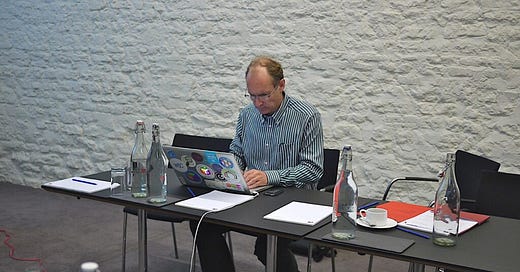Monday 8 August, 2022
The Web Master
Tim Berners-Lee, inventor of the World Wide Web, catching up on his email at a Royal Society symposium in September 2010.
Quote of the Day
Just because nobody complains doesn’t mean all parachutes are perfect”
Benny Hill
Musical alternative to the morning’s radio news
An Droichead (The Bridge) | Liam O’Flynn and Mark Knopfler
Long Read of the Day
I Speak for the Earth
The article in Resurgence in which the late, great James Lovelock outlined the Gaia concept.
Let us imagine that you are in a grove of giant redwood trees on the coast of California and that you are standing on the stump of a tree that has just been felled. When standing it was a vast tree weighing over 2,000 tons and over 100 metres tall, a spire of lignin and cellulose, a tree that started life over 2,000 years ago.
A strange thing about this tree is that during its life nearly all of it was dead wood. As a tree grows there is just a thin skin of living tissue around the circumference; the wood inside is dead, as is the bark that protects the delicate tissue. More than 97% of the tree we stand on was dead before it was cut down.
Now in this way a tree is very like the Earth itself. Around the circumference on the surface of the Earth is a thin skin of living tissue of which both the trees and we humans are a part. The rocks beneath our feet are like the wood, and the air above is like the bark. Both are dead matter, but the air and rocks, like the wood and the bark, are either the direct products of life or have been greatly modified by its presence. Is it possible that the Earth is alive like the tree?
Do read on. It’s remarkable.
The end of ‘tech exceptionalism’?
Yesterday’s Observer column:
While the pandemic had put many conventional companies on life support, it looked as though it had consolidated the dominance of Alphabet (neé Google), Amazon, Facebook, Microsoft and Apple, making them the new masters of our networked universe.
And then something happened. On 19 November 2021 the Nasdaq stock market index (which is heavily influenced by tech companies) stood at an all-time high of 16,057, then suddenly went into rapid decline. As I write, it stands at 12,369. And so the question became: was this just what economists euphemistically call a “market correction” or an indicator that this particular speculative bubble had really burst?
The answer, if the quarterly figures released last week by the tech giants are anything to go by, is that it looks as though the bubble has at least been punctured…
Tinkerbell Truss
From Jonny Bloom’s blog…
I had no idea that there was something called the Tinkerbell Effect, but there is. The term describes things that are thought to exist only because people believe in them.
Now it is now an economic principle as proposed by Liz Truss. If we close our eyes and believe in economic growth enough, the recession won’t happen.
It is true that expectations do alter economic behaviour but just banning the mention of the word recession and thinking that means it won’t happen is as realistic as Peter Pan…
The political party that brought the UK austerity, Brexit and other disasters is on track to install another fantasist as Prime Minister.
My commonplace booklet
What not to do when you see an avalanche heading in your direction
Don’t stay to make a nice holiday video. Link




